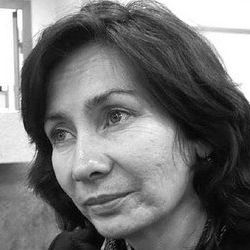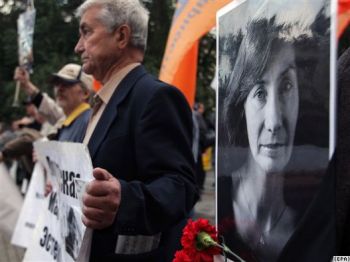 The deaths of certain journalists have attracted worldwide attention and condemnation, for example the killing of Georgiy Gongadze in Ukraine in 2000, of Anna Politkovskaya, in the Russian Federation in 2006, and of Natalia Estemirova, right, in 2009. Many more attacks, deaths and disappearances such as Dmitry Zavadsky, below left, in Belarus in 2000, have been recorded by local and international monitors.
The deaths of certain journalists have attracted worldwide attention and condemnation, for example the killing of Georgiy Gongadze in Ukraine in 2000, of Anna Politkovskaya, in the Russian Federation in 2006, and of Natalia Estemirova, right, in 2009. Many more attacks, deaths and disappearances such as Dmitry Zavadsky, below left, in Belarus in 2000, have been recorded by local and international monitors.
Yet, not one of these incidents has resulted in a full and effective investigation, and only a limited number of perpetrators have been tried and sentenced. Indeed, the majority of cases involving violence against journalists have been flatly ignored by the authorities or attributed to any other cause except the work they do.
 Climate of impunity
Climate of impunity
The result of the grossly inadequate responses of the governments of Belarus, the Russian Federation and Ukraine in relation to attacks on journalists has been the emergence of a climate of impunity, violations of journalists’ human rights and a chilling effect on freedom of expression in these states. Attacks on journalists not only represent attacks on the rights of individual victims and their families, but also an attack on the right to freely receive and share information and ideas.
The three governments have failed to protect journalists in the pursuit of their profession, and have failed in implementing their own respective laws in this area.
 These statements are an outcome of the international conference Ten years on – no justice for "Georgiy Gongadze, right: the Need to Find New Ways to Fight Impunity", organized by Article 19 and IMS on 16 September 2010 in Kyiv, Ukraine. The aim of the conference was to address the protection of journalists in Belarus, the Russian Federation and Ukraine, including the use of violence as a means of controlling the media, the lack of effective government interventions to prevent and investigate abuses, and the resultant chilling effect on the media environment. The conference also redefined advocacy strategies to combat impunity in a constructive way.
These statements are an outcome of the international conference Ten years on – no justice for "Georgiy Gongadze, right: the Need to Find New Ways to Fight Impunity", organized by Article 19 and IMS on 16 September 2010 in Kyiv, Ukraine. The aim of the conference was to address the protection of journalists in Belarus, the Russian Federation and Ukraine, including the use of violence as a means of controlling the media, the lack of effective government interventions to prevent and investigate abuses, and the resultant chilling effect on the media environment. The conference also redefined advocacy strategies to combat impunity in a constructive way.
Breach of international obligations
According to the participants of the conference, the impunity for attacks, disappearances and killings of journalists places the governments of Belarus, the Russian Federation and Ukraine in breach of their obligations under international and European human rights law, particularly the positive obligations in relation to the rights to freedom of opinion and expression, the right to life and the right not to be subject to torture, cruel, inhuman or degrading treatment.
The International Covenant on Civil and Political Rights has been ratified by all three states and the European Convention on Human Rights has been ratified by the Russian Federation and Ukraine.
The conference adopted several recommendations. The authorities of Belarus, the Russian Federation and Ukraine should immediately adopt all necessary political, legal and administrative measures to fully protect journalists and defend the right to freedom of expression, in accordance with their international responsibilities, including to:
• Recognise publicly that journalists are especially vulnerable to violence because of the work they do, which should always be considered as a motive from the start of any investigation into an attack, death or disappearance
• Publicly condemn threats, attacks, deaths and disappearances of journalists without prejudice and withhold fully from spreading negative propaganda about the journalist in question
• Design and implement effective legislation and policy to promote and protect journalists, enabling them to work in free and safe environments
• Train public officials, especially law enforcement officials, in providing an effective and rapid response when journalists are threatened, including emergency measures to protect them from even greater harm
• Put in place appropriate and effective protection mechanisms for journalists under threat
• In the event of an attack, launch a full, prompt, effective and independent investigation in order to bring both the perpetrators and the instigators to justice, and ensure that where there is a possibility of involvement of local authorities or other government bodies with a conflict of interest, such an investigation is moved to a different authority outside their jurisdiction or sphere of influence
• Provide up-to-date, ongoing information about the development of such investigations, in the first instance to the next-to-kin and their lawyers, as well as to the general public
• Put in place specific measures to prevent the repetition of such acts
• Pay special attention to facilitating the work of civil society and media organizations regarding freedom of expression and protection of jo urnalists
urnalists
• Sign and ratify the International Convention for the Protection of All Persons from Enforced Disappearance and apply the principle of universal jurisdiction on their territories.
Left. Aleh Byabenin, the founder and head of the renowned Belarusian website http://www.charter97.org, was found dead in his summer cottage not far from Minsk on 3 September 2010.
International pressure important
Intergovernmental organisations and the international community should also assist by prioritising the protection of journalists in their respective agendas with the Russian Federation, Belarus and Ukraine.
They should be ready to assist these states to comply with their international obligations regarding human rights according to international law, including following-up on the implementation of relevant decisions and judgements of international human rights bodies, such as the European Court of Human Rights and the United Nations Human Rights Committee.
Civil society to combat impunity?
Civil society and media organisations should continue to monitor the protection of journalists and the right to freedom of expression in Belarus, the Russian Federation and Ukraine. In particular, they should consolidate their support to the investigations into attacks and ill-treatment of journalists and raise their concerns not only at  national, but also at bilateral, regional and international levels.
national, but also at bilateral, regional and international levels.
Right, Anastasia Baburova, a journalist, and Stanislav Markelov, a human rights lawyer, were shot dead in Moscow on 19 January 2009.
At national and international levels, information should be provided to the general public, who should be further engaged and encouraged to partake in any actions or campaigns to combat impunity in this regard.
Media organisations should be sensitised to their legal rights and provide adequate safety and self-protection guidance, security equipment, as well as training to both its permanent and freelance employees.
HRH London, based on Article 19 statement.
Related links:
Belarus: suspicious ‘suicide’ of human rights activist and Charter97 founder
Trial coming up for two suspects in Moscow double murder
Belarus: harassment of media grows in run-up to presidential election
2010 Impunity Index anounced by Committee to Project Journalists





